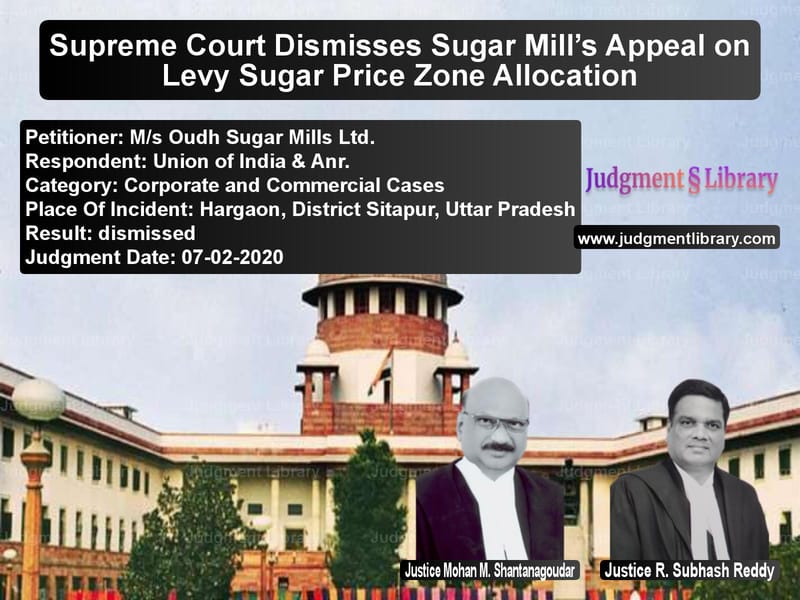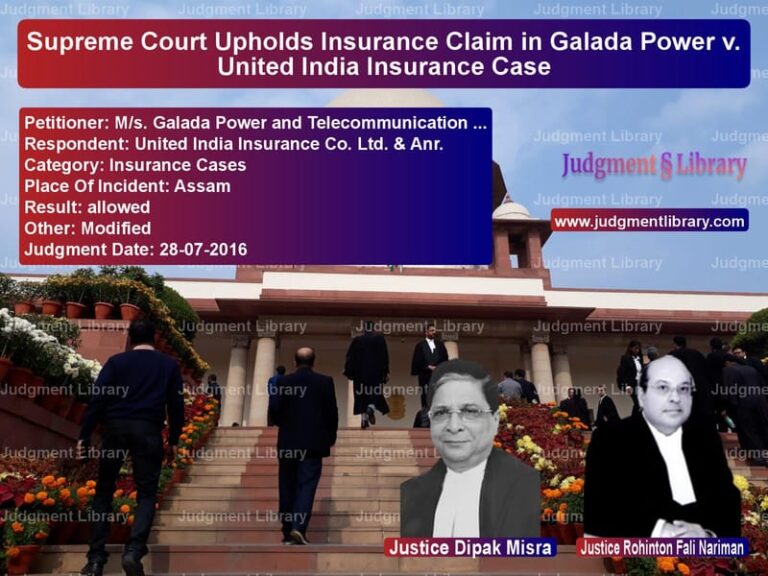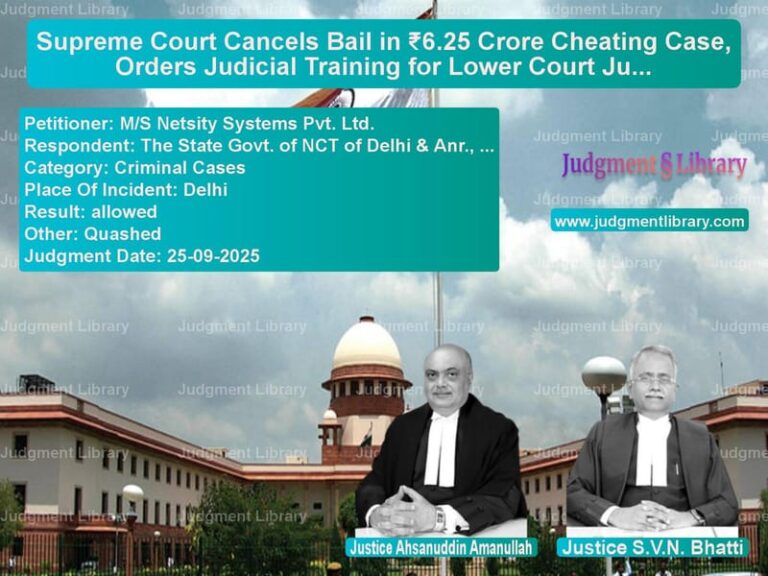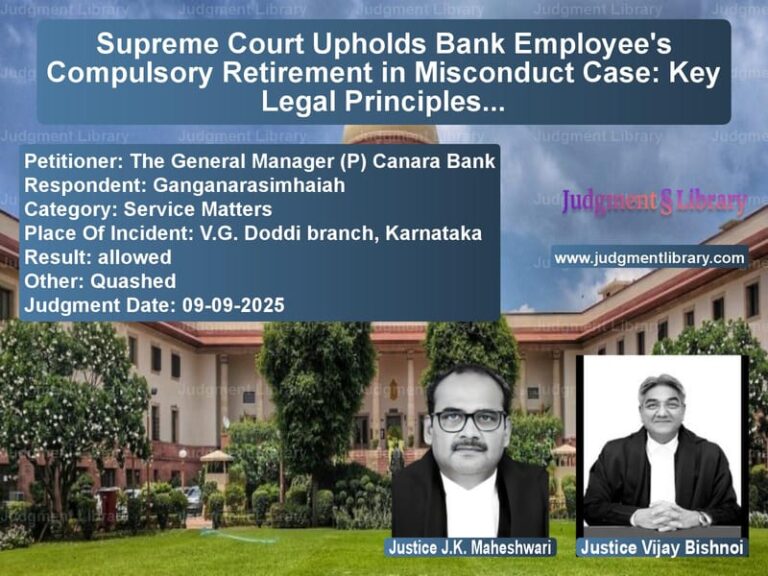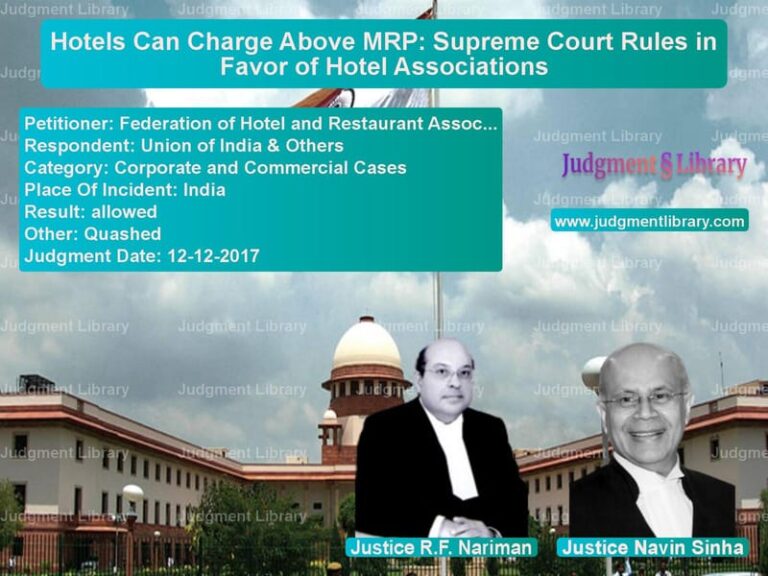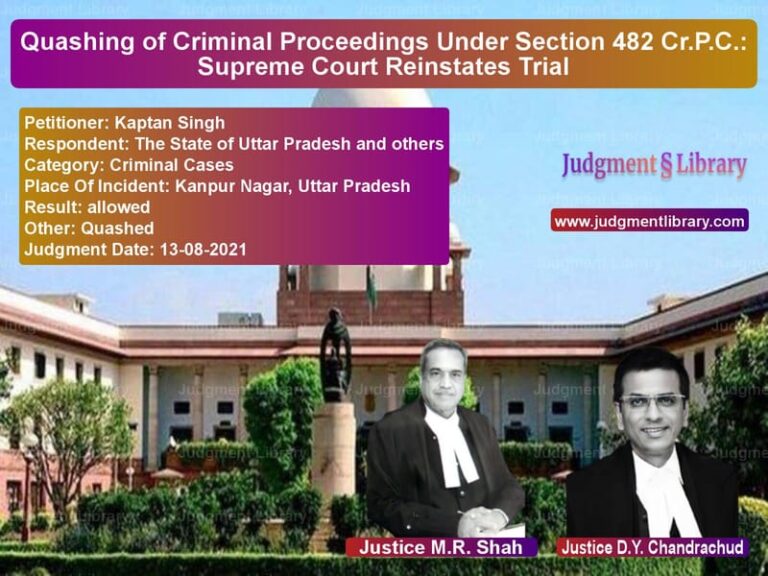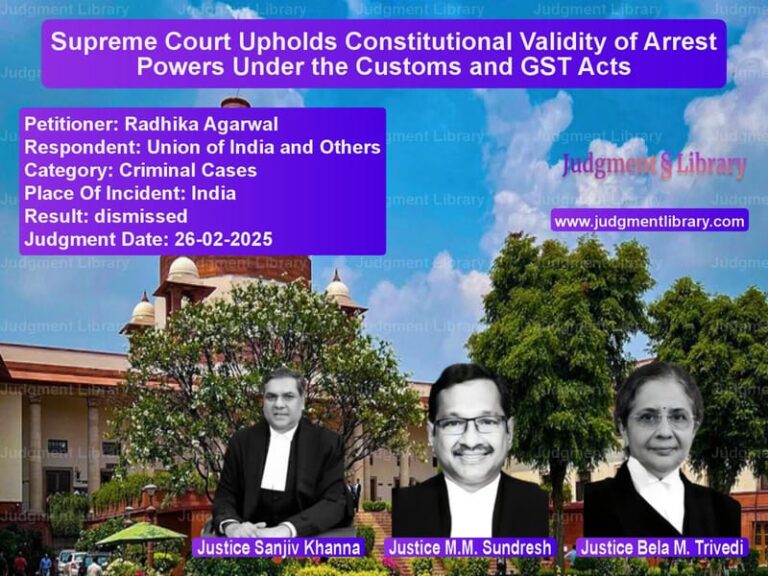Supreme Court Dismisses Sugar Mill’s Appeal on Levy Sugar Price Zone Allocation
The Supreme Court of India, in the case of M/s Oudh Sugar Mills Ltd. v. Union of India & Anr., addressed a dispute regarding the classification of a sugar mill under the central zone for the purpose of fixing levy sugar prices. The appellant, Oudh Sugar Mills Ltd., challenged the decision of the government to place it in the central zone while other sugar factories in the same district were placed in the eastern zone, resulting in differences in levy sugar pricing.
Background of the Case
The appellant, M/s Oudh Sugar Mills Ltd., is a public limited company situated at Hargaon, District Sitapur, in the State of Uttar Pradesh. It filed a writ petition before the High Court of Judicature at Allahabad, Lucknow Bench, seeking the following reliefs:
- A writ of mandamus directing the government to place the petitioner’s sugar factory in the East U.P. Zone for the purposes of the Sugar (Price Determination for 1984-85 and 1985-86 Production) Orders.
- Permission to realize the levy sugar price applicable to sugar factories in the East U.P. Zone.
- A declaration that Section 3(2)(f) and Section 3(3c) of the Essential Commodities Act, 1955 are unconstitutional.
The appellant did not press for relief regarding the constitutional validity of the provisions of the Essential Commodities Act. The High Court dismissed the writ petition and review petition, upholding the government’s classification of the appellant’s sugar mill.
Key Legal Issues
- Did the government act arbitrarily in placing the appellant’s sugar factory in the central zone while placing other factories in Sitapur district in the eastern zone?
- Did the government’s decision violate Article 14 (right to equality) and Article 19(1)(g) (freedom of trade) of the Constitution?
- Was the sugar mill entitled to receive the higher levy sugar price applicable to the eastern zone?
Arguments by the Parties
Arguments by the Appellant (Oudh Sugar Mills Ltd.)
- The geographical and climatic conditions of its sugar mill were identical to those of Seksaria Biswan Sugar Factory Ltd. and Kisan Sahkari Chini Mills Ltd., both of which were placed in the eastern zone.
- The government arbitrarily classified the sugar mill in the central zone, thereby causing financial losses to the appellant.
- The classification of zones should be uniform and should not differentiate between factories in the same district.
Arguments by the Respondents (Union of India & Others)
- The classification of sugar factories into zones was based on recommendations from expert bodies, including the Bureau of Industrial Cost & Prices (BICP).
- The factories at Biswan and Mahmoodabad were transferred to the eastern zone based on specific assessments, but such assessments did not favor the appellant.
- The levy sugar price is determined at the zonal level, not on a per-factory basis, and thus, the appellant had no inherent right to be in a particular zone.
Supreme Court’s Observations
The Supreme Court, comprising Justices Mohan M. Shantanagoudar and R. Subhash Reddy, made the following key observations:
1. Classification of Sugar Zones
The Court acknowledged that the classification of sugar factories into zones was a policy decision made by the central government based on expert recommendations. It ruled:
“The price of levy sugar is fixed for a zone with the intention to ensure reasonable returns to manufacturers within the zone, provided the units are running economically and efficiently.”
2. No Discrimination Against the Appellant
The Court held that the classification of the appellant’s factory in the central zone was not arbitrary or discriminatory. It observed:
“The appellant has failed to demonstrate any invidious discrimination or statutory violation. Merely because other units in Sitapur district were placed in the eastern zone does not entitle the appellant to similar treatment.”
3. Policy-Based Decision Making
The Court emphasized that policy decisions related to zoning and levy sugar price fixation are based on expert studies and economic considerations. It stated:
“The conclusions reached by the Central Government in exercise of statutory power cannot be said to be either discriminatory or unreasonable.”
Final Judgment
The Supreme Court dismissed the appeal, ruling that:
- The classification of sugar zones is a policy matter beyond judicial interference unless there is clear evidence of arbitrariness or discrimination.
- The appellant’s sugar factory was classified in the central zone based on economic and policy considerations.
- The appellant had no legal right to claim a particular zone classification.
Key Takeaways
- Levy sugar price zones are determined by the government based on expert recommendations and economic factors.
- Policy decisions are not subject to judicial review unless they violate constitutional principles of equality and fairness.
- Factories cannot claim a right to be placed in a particular zone solely based on geographical proximity to other factories.
- Zonal classifications affect sugar pricing but do not inherently confer any special rights on individual sugar mills.
Conclusion
The Supreme Court’s ruling in M/s Oudh Sugar Mills Ltd. v. Union of India & Anr. upholds the principle that economic policies and industrial classifications should be determined by expert committees and not subject to judicial intervention unless they violate fundamental rights. The judgment reinforces the importance of policy stability in government decision-making and prevents arbitrary challenges to economic regulations.
Petitioner Name: M/s Oudh Sugar Mills Ltd..Respondent Name: Union of India & Anr..Judgment By: Justice Mohan M. Shantanagoudar, Justice R. Subhash Reddy.Place Of Incident: Hargaon, District Sitapur, Uttar Pradesh.Judgment Date: 07-02-2020.
Don’t miss out on the full details! Download the complete judgment in PDF format below and gain valuable insights instantly!
Download Judgment: Ms Oudh Sugar Mills vs Union of India & Anr Supreme Court of India Judgment Dated 07-02-2020.pdf
Direct Downlaod Judgment: Direct downlaod this Judgment
See all petitions in unfair trade practices
See all petitions in Corporate Compliance
See all petitions in Company Law
See all petitions in Judgment by Mohan M. Shantanagoudar
See all petitions in Judgment by R. Subhash Reddy
See all petitions in dismissed
See all petitions in supreme court of India judgments February 2020
See all petitions in 2020 judgments
See all posts in Corporate and Commercial Cases Category
See all allowed petitions in Corporate and Commercial Cases Category
See all Dismissed petitions in Corporate and Commercial Cases Category
See all partially allowed petitions in Corporate and Commercial Cases Category

